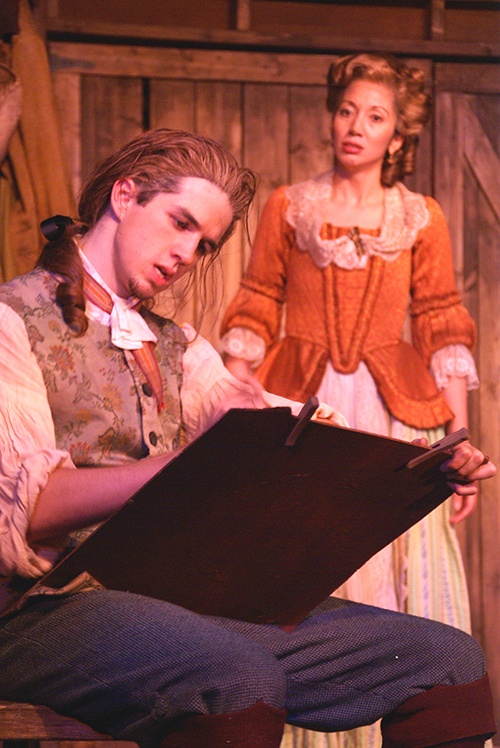Introduction and Table of Contents
 |
| Matthew Leddy, Tara Vodihn Photo from the New Theatre premiere |
|
Playwright’s Notes Act 1 Act 2 |
|
David Caudle’s Likeness transports us to a Revolutionary War-era Boston and does so with economy, taking place over the span of a single night, confined to the cramped, dimly-lit space of a barn. Edmund Farraday, a young artist, is commissioned to paint the daughter of a wealthy, tyrannical landowner, who asks him, in no few words, to misrepresent her for the family’s financial benefit. The play begins as a focused examination on the basic questions at the core of every artist, but the dynamics soon evolve as the world outside the barn bleeds in and the turbulent politics of the time become tangled with Farraday’s aesthetic angst.
By the end, the artist, standing back to regard his one-night, single-layered painting, admires the result: “There is no planning, no contrivance, but all immediacy, and honest response.” In Caudle’s work, too, we are struck by “the depth . . . in the visceral understanding of the subject.” His subjects—the prideful artist, the haughty, bratty model, her devoted governess, the ironfisted father, and the simple farmhand forced to act as prison-guard—progress through the night with nothing but immediate, honest reactions to their situation, but somehow the depth beneath them, the world outside them, and the extension of their time into our own are all fully felt. Caudle says he “revised Likeness during the Occupy movement to examine our society’s resemblance to that which we fought to reject in 1776.” This play casts it warm candlelight on the problems that have plagued America since its conception, and they will not leave us soon.
Likeness premiered on September 27, 2007, at the New Theatre in Miami, Florida, directed by Ricky J. Martinez. Blackbird presents the play in two acts, along with an accompanying statement from the playwright, blurbs from review outlets, and photos from the world premiere production at the New Theatre, as well as its later production at Federal Hall in New York City. ![]()